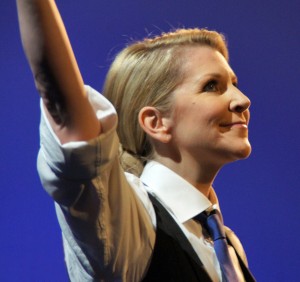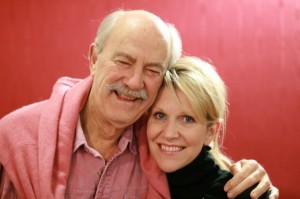Ariodante
***** […] But the singing is the glory of the set: Joyce DiDonato confirms her reputation as the finest Handelian mezzo-soprano of the day with a magnificent princely reading of the title role.”
~Rupert Christiansen The Telegraph May 2011
“Scherza infida, dead center in the opera and its molten core, is as unflinching a depiction of personal betrayal, sexual deception, and emotional dejection as opera (prior to Berg’s Lulu, anyway) has to offer, and Curtis and his Ariodante, Joyce DiDonato, go for the burn. In their hands – it’s impossible to tell who’s influencing whom, but when these two musicians start mixing it up, you want to be there – this comes close to being ugly music. The aria’s musical line as envisioned by Curtis and rendered by DiDonato has lacerating, spiny shapes, and at peak moments steps far outside comfy norms of singing or, for that matter, music. It’s Baroque Sprechstimme, and you won’t be forgetting it anytime soon.
DiDonato sings the aria with grave beauty on her Furore Handel CD with Christophe Rousset, so there’s hard evidence that she can sing it better than anyone else. So instead of singing it better than that, she just climbs inside Ariodante’s despair and lets you have it with both barrels.
And in case you thought that was a one-off stunt, she comes back at the beginning of Act III – different day, same mood – with “Cieca notte, infidi sguardi,” truly polished singing that takes DiDonato to some of the lowest notes she’s committed to disc, and it makes your blood run backwards.”
~ Tim Pfaff The Bay Area Reporter July 2011
“Soon Ariodante appears, in one of Handel’s most spectacular introductory arias, ‘Con l’ali di costanza.’ Here Joyce DiDonato confirms her status as today’s reigning Handelian mezzo-soprano. She braves the fearsome coloratura rigors (including bold 16th-note runs that prompted Handel’s contemporary, Charles Burney, to complain that Act 1 is nothing but “wings and flying”) with shining technical and musical aplomb.
Much the same could be said for her other tour de force, Ariodante’s noble, climactic aria of triumph, ‘Dopo note atra e fenesto,’ in Act 3; here DiDonato’s tone is firm and full, her rhythm precise, her runs secure, her ornamentation clean, even and expressive. If ‘Scherza infida’ (sung as the prince contemplates the apparent infidelity of his intended) isn’t quite as heart-rending as Lorraine Hunt Lieberson’s on the McGegan set, DiDonato summons ravishing vocal colorations to limn the hero’s bitter, disconsolate state in this, one of Handel’s greatest expressions of grief. It is here that DiDonato proves her superiority in the role to Minkowski’s primo uomo, Anne Sofie von Otter, a conscientious and intelligent singer who, try as she might, does not inhabit Handel’s world as comfortably as DiDonato. I have heard nothing better from the American mezzo on recordings.”
~ John von Rhein The Classical Review July 2011

